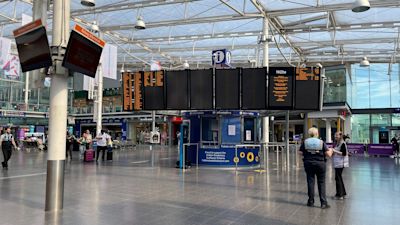Empty departure boards and deserted train stations as rail strikes take place across North West

ITV Granada Reports' journalist Zoe Muldoon has the latest on the rail strikes affecting the region.
Thousands of passengers in the North West are facing travel disruption today as the biggest rail strike in three decades takes place across the country.
Usually busy train stations, such as Manchester Piccadilly and Liverpool Lime Street, are almost deserted, except for rail union picket lines.
Rail workers are staging industrial action on Tuesday, Thursday and Saturday in a dispute over pay, jobs and working conditions.
Avanti, Cross Country, TransPennine and Northern are running an extremely limited timetable and passengers are advised not to travel unless absolutely necessary.
With around 80% of trains cancelled across Britain on the planned action days, it is the biggest strike in a generation - and there are now fears it could last months.
Around 40,000 members of the Rail, Maritime and Transport (RMT) union at Network Rail and 13 train operators have walked out in a bitter dispute over pay, jobs and conditions.
In Manchester a trickle of travellers entered and left a largely deserted Piccadilly train station as RMT pickets stood outside the entrances.
Clayton Clive, RMT branch secretary for Manchester South, said: “The average person who travels by train has been very supportive, they can see that the inflated wages put out by the train operators are false and they are trying to turn worker against worker.
“We have had a positive reaction from the public, people taking leaflets and tooting horns.
“We do not want to cause anyone any inconvenience, or make people late for work but we have been backed into a corner where we have no other choice but to take this action and I think people can see that."
Manchester Piccadilly station, which handled more than 130,000 visitors last weekend, was running just 20% of normal weekday services.
Trains were running on some main lines, to Liverpool, York and Newcastle, but local routes were stopped.
Phil James, route director for Network Rail in the North West, said: “So some of the more local commuter lines are seeing very little in terms of train services today.
“So it’s not great for passengers, we recognise that and we have been advising passengers to check before they travel and clearly you can see some people have heeded our advice.”
Several events have been affected by the strikes including the biggest music festival in the UK, which is happening this weekend.
An NHS worker from Liverpool has said he fears he will not be allowed into Glastonbury Festival due to strikes scuppering his travel plans.
Huw, who did not wish to share his second name, needs to travel via a festival-organised coach from Brighton at 7am on Wednesday.
He says he does not finish work until 9pm on Tuesday and the final train from Liverpool to London is at 4pm.
Huw said he has now spent £70 on the earliest available bus to the festival on Thursday morning hoping he will be allowed entrance.
“Festival tickets are given out on the coach, so there’s a very real possibility that this rail strike means I can’t actually get into the festival,” he said.
“I’m making my own way from Liverpool on Thursday morning and will be relying on the goodwill of the Brighton coach driver to hand my festival ticket over either to the box office or to my mates who’ll meet me at the gate… hopefully common sense prevails.”
The Prime Minister has urged commuters to "stay the course", which suggests that passengers must endure the strikes in order to beat the union and reform the railways.
He said: “We need, I’m afraid, everybody, and I say this to the country as a whole, we need to get ready to stay the course.
“To stay the course, because these reforms, these improvements in the way we run our railways are in the interests of the travelling public, they will help to cut costs for farepayers up and down the country.”
Appearing on Good Morning Britain, Transport Secretary Grant Shapps said he is ready for six months of strikes although he hopes it will not take that long.He says they will "change laws and will absolutely do everything possible to protect the travelling public to make sure we can't be held to ransom as a nation by an extremist union".
Want a quick and expert briefing on the biggest news stories? Listen to our latest podcasts to find out What You Need To Know